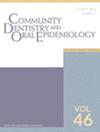Findings from the 2019 nationally representative oral health survey for adults in Singapore
Abstract
Objectives
The aim of this study was to present key findings from the 2019 national adult oral health survey in Singapore (NAOHS).
Methods
A multi-stage stratified sampling method was used to recruit participants for a representative national adult oral health survey. A total of 12 212 households were randomly selected from the National Database on Dwellings in Singapore. Within each household eligible persons aged ≥65 years were automatically invited to participate while a Kish selection method was used to invite those between 21 and 64 years old. The survey comprised a face-to-face interview questionnaire and a clinical examination which recorded details of tooth loss, DMFT, DMFS and prevalence of periodontal disease according to the CPITN and the US CDC-AAP classifications. Weighted analysis was performed to adjust for oversampling, non-response and post-stratification. Multivariate regression with backward stepwise selection was carried out to identify predictors of chronic periodontal disease and untreated dental caries.
Results
Six hundred and sixty-three participants completed both the questionnaires and the clinical examination. The prevalence of edentulousness was 2.7%. Of participants, 34.8% presented with untreated dental caries with a higher proportion found in those who were aged ≥60 years, of Malay ethnicity, living in 1–2-room public housing and who only visited the dentist when there was a problem. Mean DMFS and DMFT indices were 24.7 and 7.9 respectively. Based on the CDC-AAP classification, the prevalence of moderate–severe chronic periodontitis was 56.9% and increased with age, with a higher proportion in males. Participants with untreated dental caries were more likely to have moderate or severe periodontal disease.
Conclusions
Survey findings showed high prevalence of dental caries and periodontal disease, at 34.8% and 77.6% respectively. A clear socio-economic gradient in the distribution of tooth loss, untreated dental caries and moderate-to-severe periodontitis was observed.

 求助内容:
求助内容: 应助结果提醒方式:
应助结果提醒方式:


